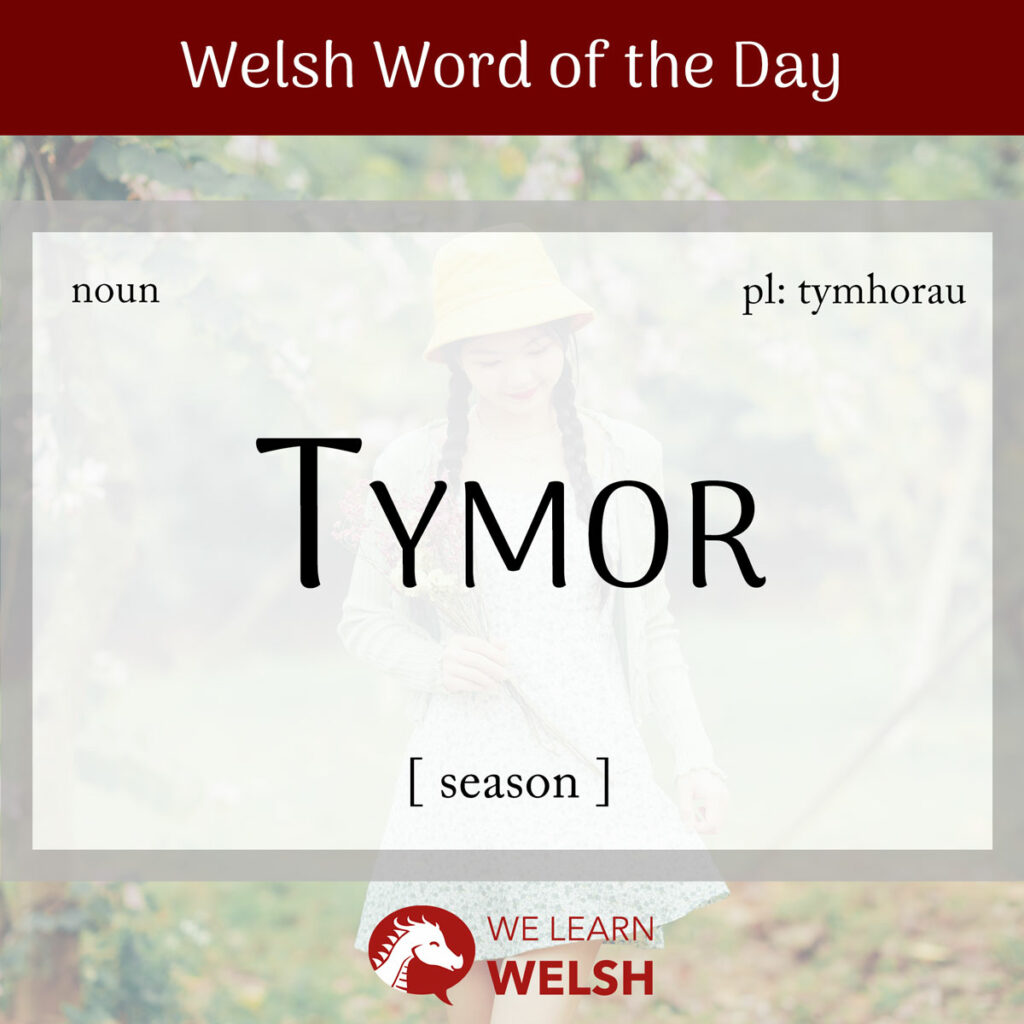There are two words you could use to translate the word season into Welsh. One of these is adeg, which refers more generally to either a period of time or a specific of time. The other word, which is the subject of this article, is tymor. Its plural is tymhorau (seasons).
tymor
season / term
It sounds a bit like the word time. This is for very good reason, as it was borrowed into Middle Welsh from the Latin *tempus, which is the same root of a lot of our time-related vocabulary. In Middle Welsh it was spelt tymhor, which is why the plural includes this extra h – as does the word tymhorol (seasonal).
Tymor is a masculine noun, while its counterpart adeg is feminine. Because it’s masculine it doesn’t mutate after y (the), but remains y tymor.
When it does mutate, it does so like this:
Soft mutation
dymor
Nasal mutation
nhymor
Aspirate mutation
thymor
We tend to talk about seasons in two main senses. One is when we’re talking about a time of the year in which particular activities or weather phenomena occur.
For example, tymor pêl-droed (football season) or tymor y glawogydd (the rainy season). In this kind of phrase we can often substitute adeg in for tymor and it makes just as much sense.
The other is to group together gwanwyn (spring), haf (summer), hydref (autumn) and gaeaf (winter).

Although, these four fixed tymhorau aren’t necessarily the best representation of how the changes in nature and weather throughout the year would have been understood in Wales traditionally.
Historically, the blwyddyn (year) would have just been broadly divided into the warmer part of the year, haf, and the colder part of the year, gaeaf (winter), with the following terms sometimes used if more specificity was needed:
- tymor ŵyna = lambing season
- cyntefin = the beginning of summer / spring
- cynhaeaf = harvest time
- medi = harvest time (now appears in mis Medi, September)
- cefn gaeaf / twll y gaeaf = deep winter
- hirlwm = late winter
Though in Wales glaw (rain) tends to be a recurrent phenomenon through the year, there is certainly still amrywiad tymhorol (seasonal variation) in the tywydd (weather). The tymhorau are also particularly important in Wales because it’s a country which has been so reliant on the tymor-sensitive industry of amaeth (agriculture).
Mae ‘na bedwar tymor yn y flwyddyn.
There are four seasons in the year.
Something I’m trying to get better at is eating bwyd (food) that is tymhorol (seasonal / in season), as this means you can get UK-produced food that hasn’t been preserved for a long time, making it more environmentally friendly.
There are a few different ways you can describe in-season food – to be in season is bod yn dymhyrol, but you could also announce that something’s come into season by saying, for example, mae mafon yn eu tymor (raspberries are in season).
This is also a phrase where you could also substitute in adeg. So, another example might be roedd tatws yn eu hadeg (potatoes were in season).
Don’t fret too much about adeg having turned into hadeg here – this is called h-prosthesis and it happens to words beginning with vowels after eu (their), ein (our), and ei (his / her) when it is used to mean her. It isn’t adhered to that strictly and if you forget about it it really doesn’t matter!
Ro‘n i’n mynd i brynu afalau, ond maen nhw allan o dymor.
I was going to buy apples, but they’re out of season.
Tymor also means term, and this comes in handy when you’re talking about tymhorau’r ysgol (school terms). However, tymor is not used to refer to the terfynau (terms) of a contract, or a term as in a gair (word).
- tymor ysgol = school term
- tymor prifysgol = university term
- hanner tymor = half term
- y tymor byr = the short term
- y tymor hir = the long term
- y tymor canol / y canoldymor = the medium term
- tymor yn (y) swydd = term in office
Another useful word is cyfnod, which means period or duration, so it’s synonymous with tymor in many cases. For example, you could just as easily say cyfnod yn (y) swydd. And a season ticket is either a tocyn gyfnod or a tocyn dymor.
In the South, people may also call school terms chwarteri ysgol (literally school quarters). I always thought this was a bit weird as the school year is generally divided into three tymhorau rather than quarters, but maybe a helpful Southerner can clarify?


